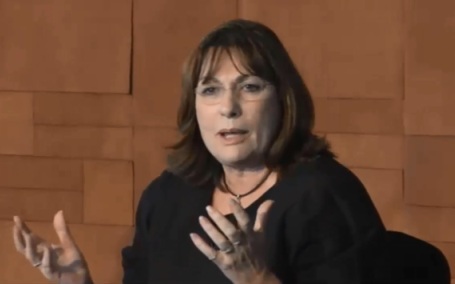Three leading thinkers in education - Professor Geoff Masters AO, Dr Michele Bruniges AM and Sir Michael Barber - gathered in Sydney last month to discuss assessment reform and innovation.
This special event was part of the Australian Council for Education Research (ACER) Rolling Summit. The conversation covered a range of topics, including the role of technology in authentic assessment, changing pedagogy and what it means to learn and make progress.
Here's a taste of what the panel had to say.
What will assessment systems look like in 10 years time?
Sir Michael Barber, a former adviser to the Blair Government in the UK, predicts a future in which new technology, virtual learning environments and digital platforms will allow educators to combine authentic assessment and testing. 'I think schools and teachers will use that digital technology to monitor student learning, indeed students increasingly will use it to monitor their own learning and they will be getting feedback pretty much instantly.
'The schools will have the data they need to drive student performance up, to monitor progress, to tailor learning programs, to create collaborative learning environments where collaborative problem solving can be assessed … and from that, the system will be able to get the data it needs to monitor performance without asking for anything extra.
‘If you think of the best computer games where you can collaborate, you can find more than one route to the right answer, often there's more than one answer that's right and there are several ways of getting there, and you get instant feedback – that's what assessment might turn out to be like and I think that would be really pretty exciting.'
However, he went on to say that data and technology alone will not be enough to transform learning. 'The data plus the technology, plus a teacher [or group of teachers] teaching in a new way, will be quite powerful. And the characteristics of that teacher will be what [John Hattie] talks about: the teacher as activator, inspiring, challenging mediocrity, pushing people over the hump when learning looks too difficult … constantly providing a challenge, bringing together ideas and being an inspiring person as well as sometimes a subject content expert or a problem solver.
‘In these new assessment environments [we're imagining] I think it's going to be perfectly plausible to assess a much wider range of outcomes that are important, including positive attitudes, collaboration, leadership, resilience – all of those are part of growth, beyond just growth in your mathematics or literacy. … Hopefully the assessment paradigm can become a much broader thing than what we've been used to in the past.'
Relevance and feedback, for students and teachers
Dr Michele Bruniges AM, Secretary of the New South Wales Department of Education, told the audience that one of the biggest issues is the rate of reform. 'I think we really have to turn our attention to the rate of reform that's required today to ensure that we do have engaged students [around learning and assessment].

Dr Michele Bruniges AM, Secretary of the New South Wales Department of Education.
'Technology provides a wonderful pathway to get the relevance and immediate feedback for both teachers and students to ensure that they are self-monitoring and pacing what's actually happening. … Why aren't we, in systems, thinking about great calibrated tasks that have relevance using virtual worlds so that students can self-select, engage, [receive] information, feedback? [So], there's that notion of assessment reform.'
She said educators who reflect back in their teaching practice about good assessment tasks and the purpose of assessment understand that it is not an end point of teaching and learning, rather it informs the next steps. 'And then there's another issue there that [for a teacher] goes to: What teaching decisions do I need to make, based on the information that I have? And, for students it's the same thing: How do I select what to do next to enhance [my learning]?'
The purpose of assessment
Professor Geoff Masters AO, Chief Executive Officer of ACER, says the purpose of assessment is to establish and understand where learners are in their learning at the time of assessment.
'That information then can be used as a starting point to make decisions about the next steps in the learning process [and] what kinds of learning opportunities [educators] need to provide. And all of this is so important, because we know that students in the same year of school or students at the same age are very, very different in their levels of achievement. The most advanced 10 per cent of students in any given year of school are something like five to six years ahead of the least advanced students in that same year of school.
‘I sometimes find when I talk to people about assessment that they see it in a particular way – they understand assessment as the process of judging how well students have learnt what they've been taught. And so, under that view, the role of the curriculum is to specify what needs to be learnt, the role of teachers is to teach that specified curriculum, the role of students is to learn what teachers teach and the role of assessment is to judge and grade students.
‘The way that I think about assessment is that it's a much more professional activity – in professional work … people go to the trouble of understanding what they're dealing with: What's the situation here? What's the problem? And, how do I use my professional knowledge to address the problem in front of me?
'And that's the way that I think about teaching. It's not just a matter of delivering some pre-specified, one-size-fits-all curriculum, it's a much more difficult job than that. It's a matter of working to understand where individuals are in their learning - and that can be done at different degrees of diagnostic detail.'
The theme of ACER Research Conference 2015 is Learning assessments: Designing the future. The 16-18 August event features keynote presentations from Professor Val Shute (Florida State University), Professor Geoff Masters AO (ACER) and Dr Rukmini Banerji (Director of the ASER Centre, India), and recorded contributions from Emeritus Professor Dylan Wiliam (Institute of Education, University of London).
Visit ACER's Centre for Assessment Reform and Innovation to find out more about initiatives to lead new thinking, metrics, technologies and assessment resources and how to get involved in the Rolling Summit.



